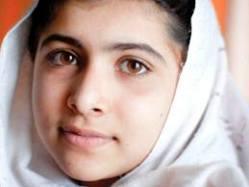
Hours before Kenyans descended on each other in the infamous 2007 post election violence, the world lost a leader: Benazir Bhutto. Bhutto, the firebrand leader of the leftist Pakistan Peoples Party, fell to an assassin’s bullet as she addressed a political rally in readiness for elections slated for the January of 2008. From CNN, I followed this story closely.
Unfortunately, Kenya’s post election violence swept away the story of Bhutto. Mainstream media was engrossed in the story of democracy gone sour. Recently enough, in May 2013, Bhutto’s story resurfaced, this time with the assassination of Chaudhry Zulfiqar Ali, the chief prosecutor in the 2007 murder case. The next time I would hear anyone mention Benazir Bhutto was during this year’s Malala Day.
What is Malala Day? Malala Day is a United Nations day set aside to commemorate the call for educating children. Named after Malala Yousafzai, a 16-year old Pakistan teen activist, Malala Day is commemorated every 12th day of July. In this year’s event, that saw Malala address a UN youth assembly, the clamor for educating children was louder than it has ever been.
Before the packed assembly, that had UN’s Secretary General Ban Ki Moon in attendance, Malala continued with her spirited agitation for empowerment of Pakistani children. She appealed to those opposed to the empowerment of young women to reconsider their hardline stances.
“I am here to speak up for the right of education of every child. I want education for the sons and the daughters of all the extremists, especially the Taliban,” said Malala in the address. In October 9 2012, hooded gunmen almost killed Malala. They boarded a school bus in which the teenager and school mates were traveling, shouted her name, frightening the passengers to identifying her, then shot her at the head.
These were the Taliban determined to silence pro-empowerment voices in Pakistan. To the Taliban, Malala reiterated that she did not harbor any bad blood. She owned that the pink shawl she was wearing belonged to the slain Benazir Bhutto. Malala is determined to talk of the challenge the Taliban philosophy. Unwaveringly.
Malala draws inspiration from Muhammad, Jesus Christ, Lord Budha, Martin Luther King, Nelson Mandela, Mohandas Gandhi, and Mother Teresa.
In this light, it is clear that nothing is stopping Malala from getting what she deserves. She has redefined determination across children in Pakistan. In a 2011 interview with CNN, Malala said unequivocally that she is fighting for the rights of children. Children, according to Malala, have the right to education, right to play, right to sing, right to go to the market, and right to speak up.
It is the last right, the right to speak up, that I prescribe for all across the age continuum. Everybody should learn to speak up. In any society, nobody should allow the subjugation of his right to speak up. By speaking up, individuals get their feelings, fears and aspirations known. Speaking up initiates discussions and fertilizes development.
And it does not matter in what forum one is speaking. It does not matter whether the media is training its cameras on you. Do not wait for a UN assembly to start your speaking up. The wait may be long.
Mainstream media has been trained to focus on the bourgeoisie. Issues affecting the haves in the society cannot pass the editor’s eyes. Obesity is more newsworthy than starvation. Forgive the commercial orientation of the mainstream media and the successful conditioning of the media consumers. With social media, everyone should just speak up.
Social media gives individuals unparalleled power to speak up on issues affecting them and the larger society. This explains the need for exercising caution when judging on the diversity of topics, frames and orientations characterizing the conversations on Facebook, Twitter, WhatsApp and blogs.
Chief Francis Kariuki, for instance, a popular Twitter handle in Kenya, updates on topics that scores take for banter. If not reporting on lost cattle, this handle would be reporting on the triumph of villagers in Nakuru against a chicken thief. Sometimes, the administrator would report on a lost and found identity card. Chief Francis Kariuki’s conversations land into some ears: multiples of 22, 935 to be precise.
Retweets often come from people finding the updates comical. Individuals are conditioned to believe that worthwhile conversations should wear a certain face. This is wrong.
Conversations are relevant to the worlds of the initiators. Threads emerging from a single update can be informative and can influence decision-making. The implications to the audiences cannot be underestimated. They also give the initiators massive powers to define their destinies.
Malala came to the limelight after she penned a blog bemoaning the challenges she was undergoing accessing education under the Taliban regime in Pakistan. She personally urged the United States to intervene in ensuring that children had access to education. She was 11 years old. She kept on talking.
From this, comes the need for consistency when talking on any of the forums.
Consistency is what those extolling the appointment of blogger Dennis Itumbi to the president’s communication machinery refer to as branding. It should be easy for audiences to associate an individual with a particular line of thinking. Malala would always speak along the lines of promoting the rights of children. It would not be surprising that even in her wildest dreams, Malala did not behave contrary to this line of thinking.
Malala Day may be gone, at least for this year. However, it leaves behind serious inspirations. The determination portrayed by Malala Yousafzai would go to waste unless it is replicated in diverse forums. To make the world more habitable, to have children in school, individuals and groups should learn to keep talking.
